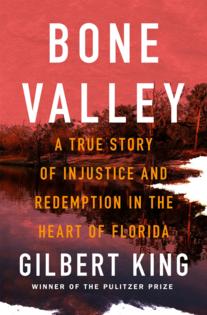Review: 'Bone Valley' is an unputdownable tale of murder and injustice
Published in Books News
Reading “Bone Valley” is like devouring a novel from John Grisham, except every word is true.
A true crime page-turner, “Bone Valley” is by Gilbert King, who won a Pulitzer Prize for “Devil in the Grove,” about an early legal case in the career of future Supreme Court justice Thurgood Marshall. “Devil” is outstanding but “Bone Valley” (which was previously a popular podcast) plays out more like a legal thriller, with astonishing twists and turns, jaw-dropping evil and a heart-tugging conclusion that would be impossible to believe if the word “nonfiction” weren’t staring at us from the back cover.
King also is a character in the book, along with assistant Kelsey Decker, who helps him look into the case of Leo Schofield, a Floridian imprisoned for more than three decades after being convicted of murdering his wife, Michelle. A judge tells King he knows Schofield is innocent, and virtually every piece of evidence that King and Decker uncover supports that viewpoint.
One small flaw in “Bone Valley” has to do with the podcast. Flipping between two timelines, the murder in 1988 and the present-day investigation, is occasionally awkward (we learn that Michelle is dead almost parenthetically, in a discussion about the podcast). And there’s too much behind-the-scenes-of-the-podcast detail. That stuff is mildly interesting but it has to compete with a story that is riveting, particularly as the investigation uncovers shocking missteps in not just Schofield’s trial but his many subsequent attempts to get someone to listen to his proclamations of innocence (in a jailhouse conversation, the man who prosecuted him literally tells Schofield he knows he didn’t do it).
The story is so astonishing that “Bone Valley” doesn’t need flashy prose. The book trusts that the details of the investigation will draw us in, as will our increasing certainty that Schofield had nothing to do with the murder. At times, the spareness of King’s writing approaches the lean, gripping feel of a Raymond Chandler novel, as in this description of competing, shaky eyewitnesses: “Now Alice Scott was claiming he was in the trailer scrubbing the carpets at the very same time? They were both State witnesses. Their stories contradicted each other. And neither one was true.”
Lots of people involved with the case, supposedly resolved for more than 30 years, were reluctant to speak to King, which makes it even more impressive that he achieved such access to key figures. He reproduces the story, for instance, of the recently accused Schofield standing on top of a tall building and his father, who believes he may be guilty, urging his son to jump. King is in the room for the wild, final confrontation in “Bone Valley.” And he gets what must be the ultimate prize for someone investigating a so-cold-it’s-freezing case: a signed confession.
Get this, though: The confession doesn’t change a thing. Even for readers who are accustomed to reports that lots of stuff is very wrong in corrupt, backward Florida, the way Schofield’s case stretches out over three decades will be eye-opening, especially since “Bone Valley” is so adept at keeping us in the dark about how these events ultimately resolve.
Smart, justifiably outraged and ultimately moving, “Bone Valley” is both a disheartening look at the state of justice today and an impossible-to-put-down yarn. It’s the best work of true crime I’ve read this year.
____
Bone Valley: A True Story of Injustice and Redemption in the Heart of Florida
By: Gilbert King.
Publisher: Flatiron, 371 pages.
©2025 The Minnesota Star Tribune. Visit at startribune.com. Distributed by Tribune Content Agency, LLC.













Comments